人教课标版B9 U4Exploring Plants Grammar(课件30张)
文档属性
| 名称 | 人教课标版B9 U4Exploring Plants Grammar(课件30张) |

|
|
| 格式 | zip | ||
| 文件大小 | 682.1KB | ||
| 资源类型 | 教案 | ||
| 版本资源 | 人教版(新课程标准) | ||
| 科目 | 英语 | ||
| 更新时间 | 2015-10-12 00:00:00 | ||
图片预览

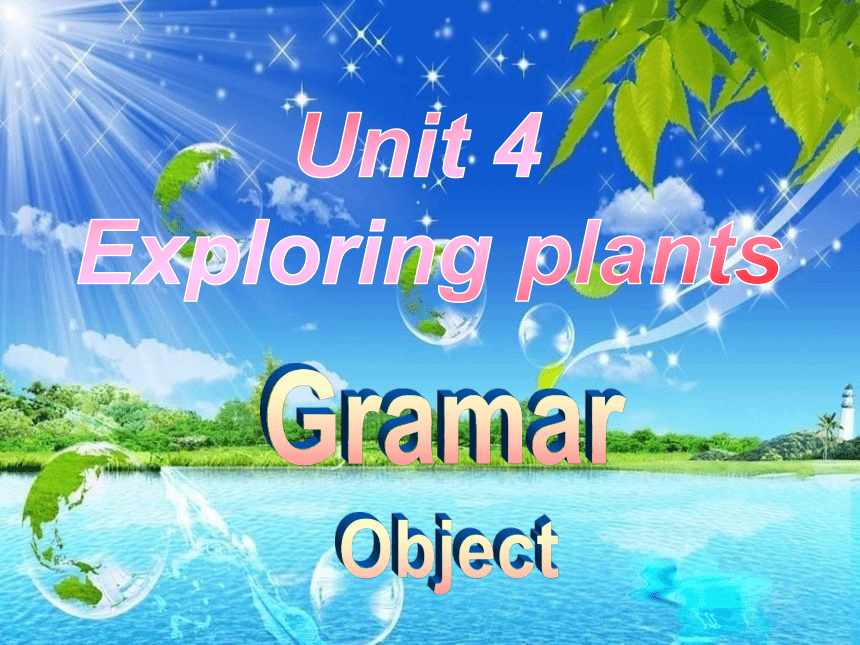

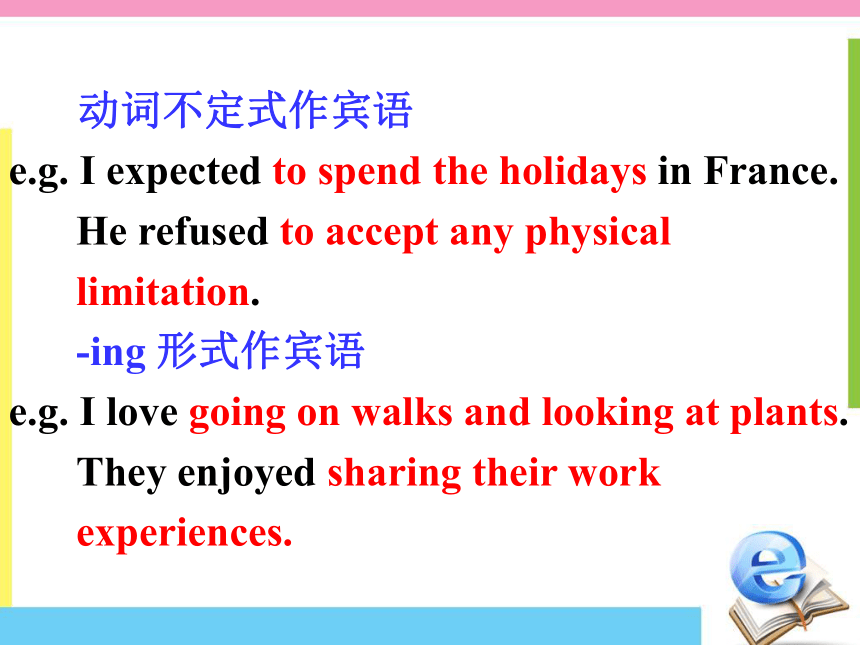

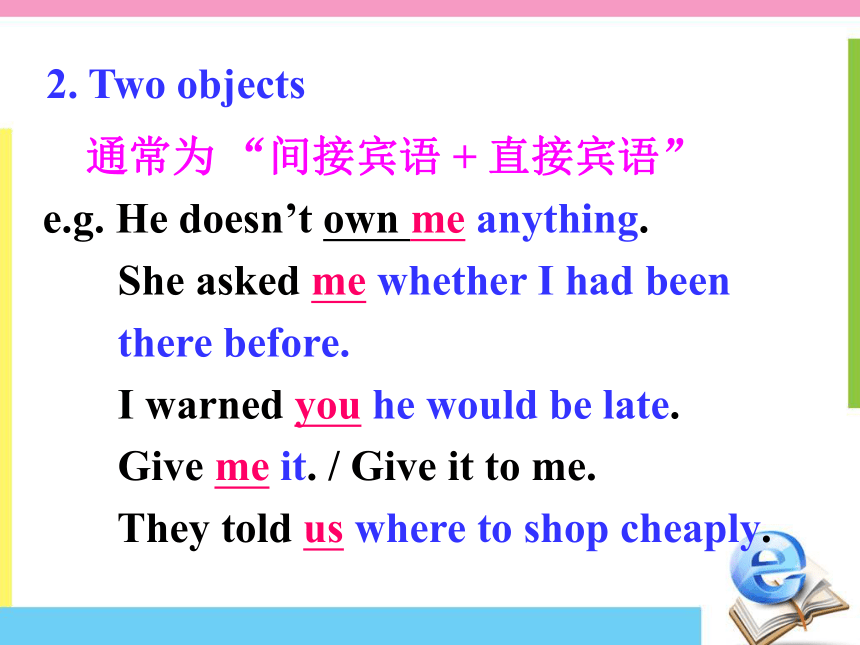
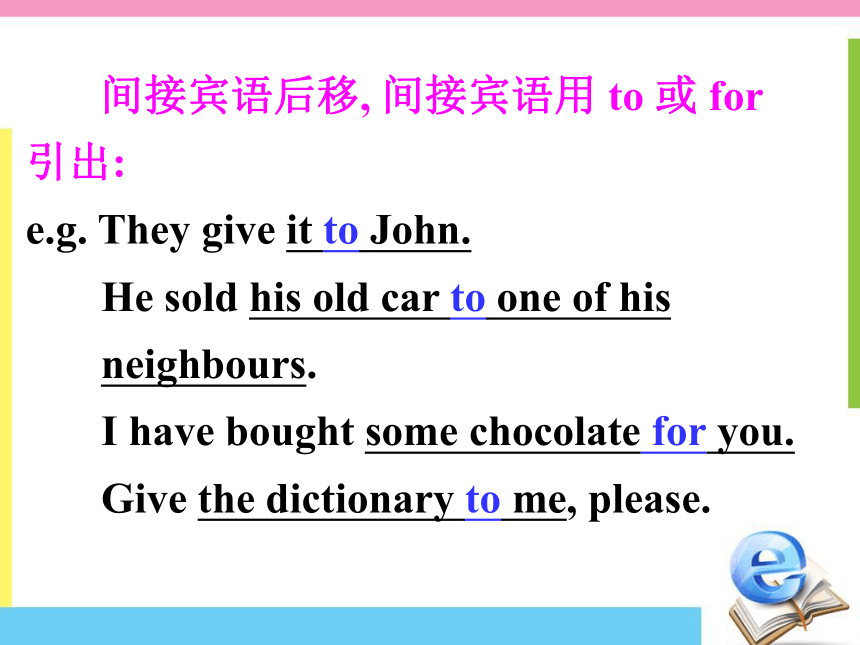

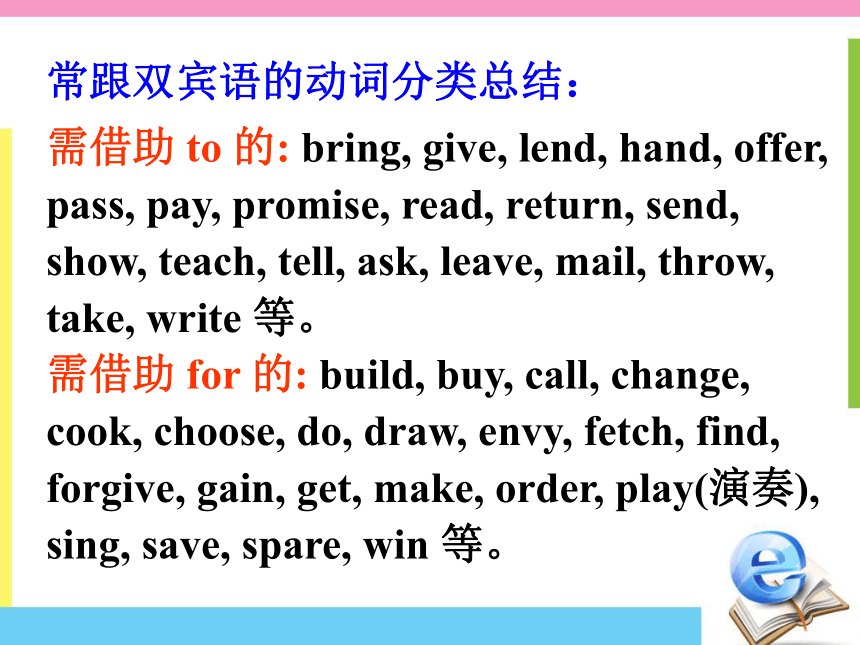

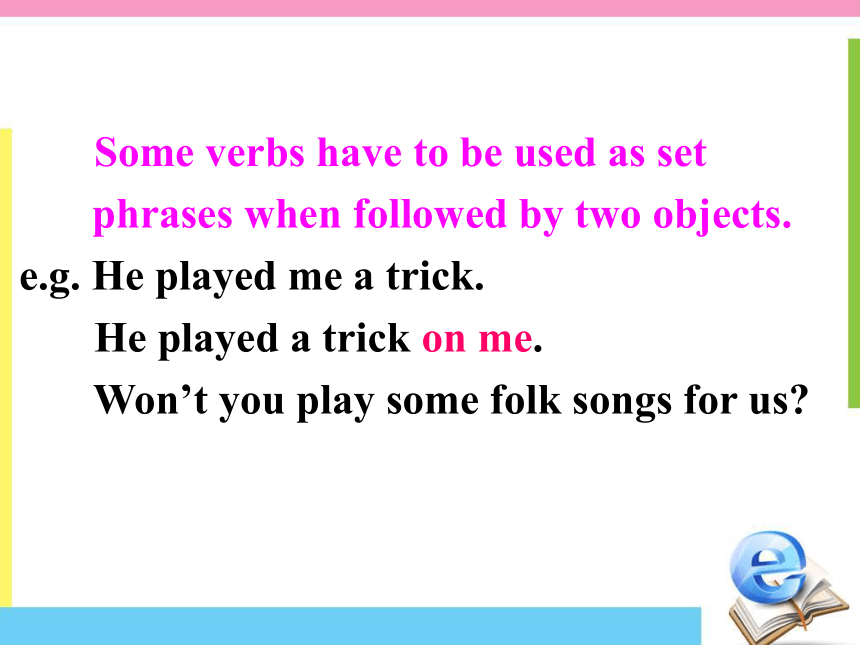
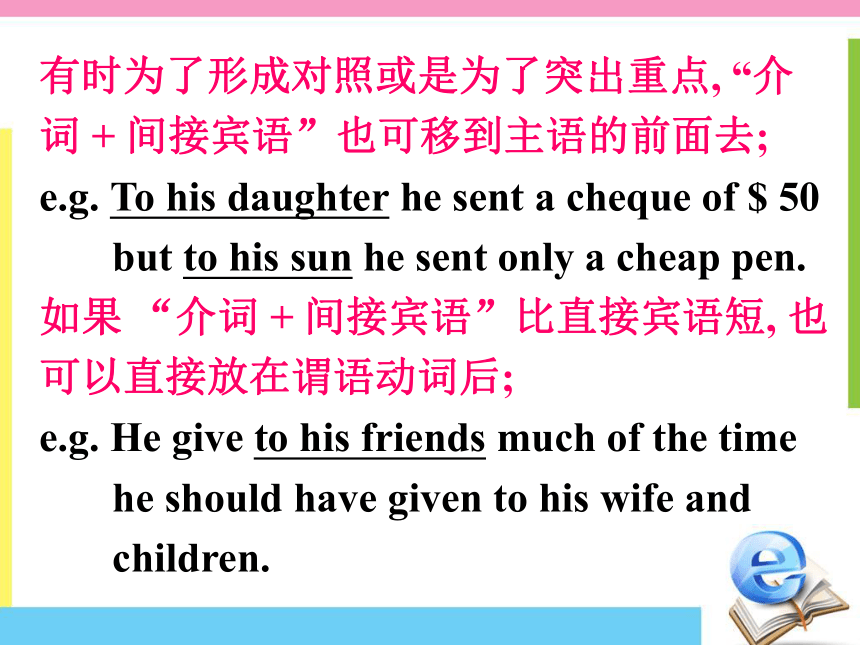
文档简介
课件30张PPT。人教课标
高三 选修 9
Unit 4ObjectUnit 4
Exploring plantsGramarThe object (宾语)1. 宾语是及物动词后的一个成分, 表示动作的对象、承受者或结果。可作宾语的有:
1. 名词、代词、数词、名词形容词
a. They collected seeds from trees.
b. Would you like something to eat?
c. They fired one-third of their works.
d. We should respect the old. 动词不定式作宾语
e.g. I expected to spend the holidays in France.
He refused to accept any physical
limitation.
-ing 形式作宾语
e.g. I love going on walks and looking at plants.
They enjoyed sharing their work
experiences. 从句做宾语
e.g. Do you think advertisements affect
your life in any way?
We seldom realize that many plants
come from countries far away.2. Two objects 通常为 “间接宾语 + 直接宾语”
e.g. He doesn’t own me anything. She asked me whether I had been
there before.
I warned you he would be late.
Give me it. / Give it to me.
They told us where to shop cheaply. 间接宾语后移, 间接宾语用 to 或 for 引出:
e.g. They give it to John.
He sold his old car to one of his neighbours.
I have bought some chocolate for you.
Give the dictionary to me, please.用 to 侧重指动作的方向, 表示朝着、 向着、对着某人。
用 for 侧重指动作的受益者, 表示为了某人, 替某人。需借助 to 的: bring, give, lend, hand, offer, pass, pay, promise, read, return, send, show, teach, tell, ask, leave, mail, throw, take, write 等。
需借助 for 的: build, buy, call, change, cook, choose, do, draw, envy, fetch, find, forgive, gain, get, make, order, play(演奏), sing, save, spare, win 等。常跟双宾语的动词分类总结:e.g. Our teacher explains to us the difficult points in the unit.
We disclosed to them the secret of our invention.
They expressed to their teacher their conviction that the experiment was true.
The guide is describing the scenic spots to the tourists. Some verbs have to be used as set phrases when followed by two objects.
e.g. He played me a trick.
He played a trick on me.
Won’t you play some folk songs for us?有时为了形成对照或是为了突出重点, “介词 + 间接宾语”也可移到主语的前面去;
e.g. To his daughter he sent a cheque of $ 50
but to his sun he sent only a cheap pen.
如果 “介词 + 间接宾语”比直接宾语短, 也可以直接放在谓语动词后;
e.g. He give to his friends much of the time
he should have given to his wife and
children.一些句子中, “间接宾语 + 直接宾语”不能变为“直接宾语 + 介词 + 间接宾语”;
e.g. He give the door a hard kick. I never give the matter a thought. She give him a warm smile. This heroic deed cost him his life.1. I can’t stand ________ with Jane in the same office. She just refuses ________ talking while she works.
A. working; stopping
B. to work; stopping
C. working; to stop
D. to work; to stop 课堂练习[考点透视]
动词 refuse, agree, fail, promise, afford, hope, choose, manage, decide, determine, offer, plan, want, pretend, wish 等后常接动词不定式作宾语。 2. Nowadays people sometimes separate
their waste to make it easier for it
________.
A. reusing B. reused
C. reuses D. to be reused
[考点透视]
it 作形式宾语时,真正的宾语可以是后面的动词不定式。3. Bill suggested ________ a meeting on
what to do for the Shanghai Expo
during the vacation.
A. having held B. to hold
C. holding D. hold 4. I hear they’ve promoted Tom, but he
didn’t mention ________ when we
talked on the phone.
A. to promote
B. having been promoted
C. having promoted
D. to be promoted [考点透视] 后接 V-ing形式作宾语的动词有:mind, enjoy, escape, practise, postpone, suggest, avoid, admit, allow, advise, finish, imagine, deny, mention 等。
[拓展] 后接 V-ing 形式作宾语的短语有:keep on, object to, look forward to, get down to, give up, put off, can’t help 等。5. Susan wanted to be independent of her
parents. She tried ________ alone, but
she didn’t like it and moved back home.
A. living B. to live
C. to be living D. having lived6. — Robert is indeed a wise man.
— Oh, yes. How often I have regretted
________ his advice!
A. to take B. taking
C. not to take D. not taking [考点透视]
有些动词后接V-ing形式和动词不定式作宾语意思不同。如:
remember to do sth. 记住要去做某事
remember doing sth. 记得做过某事
forget to do sth. 忘记要去做某事
forget doing sth. 忘记做过某事
regret to do sth. 很遗憾去做某事regret doing sth. 后悔做了某事
try to do sth. 努力去做某事
try doing sth. 试着做某事
mean to do sth. 打算做某事
mean doing sth. 意味着做某事 7. We should respect food and think about the people who don’t have ________ we have here and treat food nicely.
A. that B. which
C. what D. whether8. — It’s no use having ideas only.
— Don’t worry. Peter can show you
_____ to turn an idea into an act.
A. how B. who
C. what D. where9. When changing lanes, a driver should use his turning signal to let other drivers know ________.
A. he is entering which lane
B. which lane he is entering
C. is he entering which lane
D. which lane is he entering10. Cindy shut the door heavily and burst into tears. No one in the office knew ______ she was so angry.
where B. whether
C. that D. why11. As a new graduate, he doesn’t know
____ it takes to start a business here.
A. how B. what C. when D. which
12. Before the sales start, I make a list of
________ my kids will need for the
coming season.
A. why B. what C. how D. which[考点透视]
① 在含宾语从句的复合句中,无论主句是陈述句还是疑问句,宾语从句都用陈述句语序。
② 宾语从句可以作动词的宾语,也可以作介词的宾语。对其主要考查引导词。Thank you!
高三 选修 9
Unit 4ObjectUnit 4
Exploring plantsGramarThe object (宾语)1. 宾语是及物动词后的一个成分, 表示动作的对象、承受者或结果。可作宾语的有:
1. 名词、代词、数词、名词形容词
a. They collected seeds from trees.
b. Would you like something to eat?
c. They fired one-third of their works.
d. We should respect the old. 动词不定式作宾语
e.g. I expected to spend the holidays in France.
He refused to accept any physical
limitation.
-ing 形式作宾语
e.g. I love going on walks and looking at plants.
They enjoyed sharing their work
experiences. 从句做宾语
e.g. Do you think advertisements affect
your life in any way?
We seldom realize that many plants
come from countries far away.2. Two objects 通常为 “间接宾语 + 直接宾语”
e.g. He doesn’t own me anything. She asked me whether I had been
there before.
I warned you he would be late.
Give me it. / Give it to me.
They told us where to shop cheaply. 间接宾语后移, 间接宾语用 to 或 for 引出:
e.g. They give it to John.
He sold his old car to one of his neighbours.
I have bought some chocolate for you.
Give the dictionary to me, please.用 to 侧重指动作的方向, 表示朝着、 向着、对着某人。
用 for 侧重指动作的受益者, 表示为了某人, 替某人。需借助 to 的: bring, give, lend, hand, offer, pass, pay, promise, read, return, send, show, teach, tell, ask, leave, mail, throw, take, write 等。
需借助 for 的: build, buy, call, change, cook, choose, do, draw, envy, fetch, find, forgive, gain, get, make, order, play(演奏), sing, save, spare, win 等。常跟双宾语的动词分类总结:e.g. Our teacher explains to us the difficult points in the unit.
We disclosed to them the secret of our invention.
They expressed to their teacher their conviction that the experiment was true.
The guide is describing the scenic spots to the tourists. Some verbs have to be used as set phrases when followed by two objects.
e.g. He played me a trick.
He played a trick on me.
Won’t you play some folk songs for us?有时为了形成对照或是为了突出重点, “介词 + 间接宾语”也可移到主语的前面去;
e.g. To his daughter he sent a cheque of $ 50
but to his sun he sent only a cheap pen.
如果 “介词 + 间接宾语”比直接宾语短, 也可以直接放在谓语动词后;
e.g. He give to his friends much of the time
he should have given to his wife and
children.一些句子中, “间接宾语 + 直接宾语”不能变为“直接宾语 + 介词 + 间接宾语”;
e.g. He give the door a hard kick. I never give the matter a thought. She give him a warm smile. This heroic deed cost him his life.1. I can’t stand ________ with Jane in the same office. She just refuses ________ talking while she works.
A. working; stopping
B. to work; stopping
C. working; to stop
D. to work; to stop 课堂练习[考点透视]
动词 refuse, agree, fail, promise, afford, hope, choose, manage, decide, determine, offer, plan, want, pretend, wish 等后常接动词不定式作宾语。 2. Nowadays people sometimes separate
their waste to make it easier for it
________.
A. reusing B. reused
C. reuses D. to be reused
[考点透视]
it 作形式宾语时,真正的宾语可以是后面的动词不定式。3. Bill suggested ________ a meeting on
what to do for the Shanghai Expo
during the vacation.
A. having held B. to hold
C. holding D. hold 4. I hear they’ve promoted Tom, but he
didn’t mention ________ when we
talked on the phone.
A. to promote
B. having been promoted
C. having promoted
D. to be promoted [考点透视] 后接 V-ing形式作宾语的动词有:mind, enjoy, escape, practise, postpone, suggest, avoid, admit, allow, advise, finish, imagine, deny, mention 等。
[拓展] 后接 V-ing 形式作宾语的短语有:keep on, object to, look forward to, get down to, give up, put off, can’t help 等。5. Susan wanted to be independent of her
parents. She tried ________ alone, but
she didn’t like it and moved back home.
A. living B. to live
C. to be living D. having lived6. — Robert is indeed a wise man.
— Oh, yes. How often I have regretted
________ his advice!
A. to take B. taking
C. not to take D. not taking [考点透视]
有些动词后接V-ing形式和动词不定式作宾语意思不同。如:
remember to do sth. 记住要去做某事
remember doing sth. 记得做过某事
forget to do sth. 忘记要去做某事
forget doing sth. 忘记做过某事
regret to do sth. 很遗憾去做某事regret doing sth. 后悔做了某事
try to do sth. 努力去做某事
try doing sth. 试着做某事
mean to do sth. 打算做某事
mean doing sth. 意味着做某事 7. We should respect food and think about the people who don’t have ________ we have here and treat food nicely.
A. that B. which
C. what D. whether8. — It’s no use having ideas only.
— Don’t worry. Peter can show you
_____ to turn an idea into an act.
A. how B. who
C. what D. where9. When changing lanes, a driver should use his turning signal to let other drivers know ________.
A. he is entering which lane
B. which lane he is entering
C. is he entering which lane
D. which lane is he entering10. Cindy shut the door heavily and burst into tears. No one in the office knew ______ she was so angry.
where B. whether
C. that D. why11. As a new graduate, he doesn’t know
____ it takes to start a business here.
A. how B. what C. when D. which
12. Before the sales start, I make a list of
________ my kids will need for the
coming season.
A. why B. what C. how D. which[考点透视]
① 在含宾语从句的复合句中,无论主句是陈述句还是疑问句,宾语从句都用陈述句语序。
② 宾语从句可以作动词的宾语,也可以作介词的宾语。对其主要考查引导词。Thank you!
